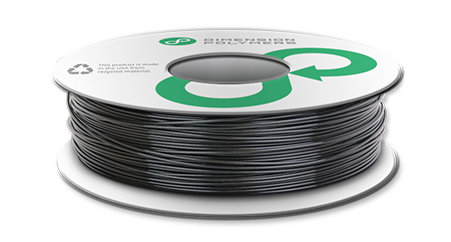Chicago-based technology start-up Dimension Polymers has developed the first professionally engineered 3D printing filament made from recycled plastic.Launched in June 2014, Dimension Polymers was founded by Gerald Galazin and Mark Sherman, who since then have developed and refined their formula to create a sustainable filament solution that is expected to reduce those carbon emissions by 66%. After rounds of beta testing with industry stakeholders and manufacturers, they have now successfully developed a product that is refined and ready to bring to market.
February 5, 2015

Chicago-based technology start-up Dimension Polymers has developed the first professionally engineered 3D printing filament made from recycled plastic.
Launched in June 2014, Dimension Polymers was founded by Gerald Galazin and Mark Sherman, who since then have developed and refined their formula to create a sustainable filament solution that is expected to reduce those carbon emissions by 66%. After rounds of beta testing with industry stakeholders and manufacturers, they have now successfully developed a product that is refined and ready to bring to market.
|
Dimension Polymers founders Gerald Galazin and Mark Sherman. |
Explaining the benefits of working with beta testers, Gerald Galazin said, "Working with recycling companies, filament manufactures, the Makerspace community, and independent hobbyists has allowed us to continually receive valuable feedback to help improve our product." He added: "The process has been fairly organic and we have been lucky enough to build great relationships with our partners, some of whom will ultimately be customers."
With the growth expected in the digital manufacturing industry, the innovation of a sustainable 3D printing filament will have a massive impact on the fast growing market. According to Wells Fargo Wealth Management 2014 research, the 3D printing market will grow from a $288 million market in 2012 to $5.7 billion in 2016. 3D printing as a technology has already demonstrated vast capacity for application across a wide variety of industries from medical to automotive to art.
Yet often, the 3D printing material currently used is produced from petroleum-based virgin plastic. With the growth rate that is anticipated in the industry in just a few short years, the impact of 3D printing on, among other things, the global environment, could, in fact, be staggering. Dimension Polymers points out that the annual consumption of 3D printing material is estimated at 30 million pounds and is projected to reach 250 million pounds by 2020, representing a 40% annual growth rate. The petroleum required to produce the amount of plastic (2.2 pounds) in a standard 3D printer cartridge results in approximately 8 pounds of carbon emissions.
"Factoring in industry growth projections, production of 3D printing plastic will result in the consumption of 1.4 million barrels of oil and generate over 800 million pounds of carbon emissions annually by 2020," the company commented in a press release.
Dimension Polymers' proprietary filament recently received approval to carry the Kingfisher Recycled Material Logo by SCS Global, one of the nation's leading third-party environmental, sustainability, and food quality certification firms. The development is a significant step in distinguishing the new material from the standard offerings in the marketplace made from virgin plastic.
And Mark Sherman thinks that having an eco-friendly 3D printing filament in the space will actually help to drive demand.
"Our package, product, and process are all designed to provide a greener alternative for the 3D printing industry," he said. "Once the industry realizes just how functional our product is, we anticipate a large shift in demand for filament made with recycled material. We hope to build awareness of the environmental footprint of 3D printing, and, in turn, spark further demand for eco-friendly materials."
Galazin and Sherman have launched a Kickstarter campaign to fund their project: https://www.kickstarter.com/projects/952621887/sustainable-3d-printing-filament
About the Author(s)
You May Also Like



